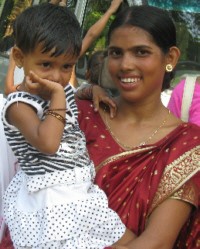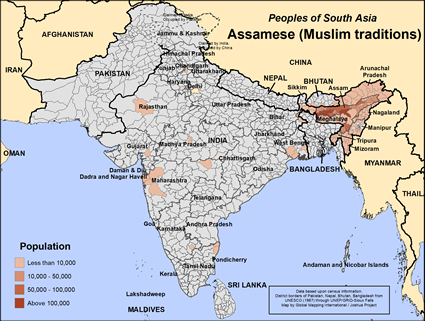Assamese (Muslim traditions) in India

Photo Source:
Anonymous
|

Map Source:
People Group data: Omid. Map geography: UNESCO / GMI. Map Design: Joshua Project.
|
| People Name: | Assamese (Muslim traditions) |
| Country: | India |
| 10/40 Window: | Yes |
| Population: | 2,728,000 |
| World Population: | 2,730,000 |
| Primary Language: | Assamese |
| Primary Religion: | Islam |
| Christian Adherents: | 0.00 % |
| Evangelicals: | 0.00 % |
| Scripture: | Complete Bible |
| Ministry Resources: | Yes |
| Jesus Film: | Yes |
| Audio Recordings: | Yes |
| People Cluster: | South Asia Muslim - other |
| Affinity Bloc: | South Asian Peoples |
| Progress Level: |
|
Introduction / History
Unlike most people groups featured in the Joshua Project website, the Muslim Assamese are a collection of Muslim peoples who live in the northeast Indian state of Assam. They make up roughly one third of the population of Assam.
One group of Assamese Muslims is indigenous Hindus who converted to Islam during the 14th century and later periods. Another group were Bengali farmers who were encouraged to come to Assam and work on the tea plantations during the British period. Yet another group of Muslims have come in recent years to escape their poverty in Bangladesh to the relative wealth of Assam. Another group are the descendants of Muslim soldiers who came to fight in Assam and decided to stay there.
The rapid growth of Muslims in Assam has not always pleased the majority Hindu citizens. There have been anti-Muslim riots. In 1983, 2000 Muslims were killed in a massacre.
Most Muslim Assamese are in involved with agriculture. They grow rice, maize, oil seeds, sugarcane, wheat and seasonal vegetables. Some work in their traditional job of brass metalworking. Others work in small commerce and trade.
The primary language of the Assamese Muslims is Assamese. Others speak Bengali and other regional languages of India.
Where Are they Located?
The vast majority of the Assamese Muslims live in Assam in northeast India.
What Are Their Lives Like?
The Muslims of Assam are different than other Muslims of India and the world. They participate in Hindu festivals and customs. Another unusual practice of these Muslims is that their daughters can inherit property from their father. Still another unusual occurrence is Muslim fathers who allow their daughters to marry Hindu men. Orthodox Muslim fathers would not allow this to happen.
The main foods of the Assamese Muslims are rice, wheat, vegetables, dairy products and maize. They eat neither beef nor pork.
What Are Their Beliefs?
As was stated earlier, the Assamese Muslims practice both Muslim and Hindu traditions of their neighbors.
The Assamese Muslims are officially Sunni, the largest branch of Islam. They attempt to obey the teachings of the Qur 'an and the prophet Muhammad. They believe that by following the Five Pillars of Islam that they will attain heaven when they die. Sunnis pray five times a day facing Mecca. They fast the month of Ramadan. They attend mosque services on Friday. If a Muslim has the means, he or she will make a pilgrimage to Mecca once in his or her lifetime.
The two main holidays for Sunni Muslim are Eid al Fitr, the breaking of the monthly fast and Eid al Adha, the celebration of Abraham's willingness to sacrifice his son to Allah.
At the same time, the Assamese Muslims celebrate the main Hindu holidays of Holi, the festival of colors, Diwali, the festival of lights and Navratri, the celebration of autumn.
What Are Their Needs?
The Muslim Assamese need to hear the life-changing message of Jesus Christ in a way than can understand. They need protection from the Hindu majority who at times perpetrate violence against them. The Hindus and Muslims of Assam must learn to understand and each accept each other.
Prayer Points
Pray that the Lord moves the Assamese Muslims to seek protection in Him not in weapons or violence.
Pray for Muslim Assamese families and communities to discover and embrace the free gift of life found by trusting Christ and his finished work.
Pray that many of the Assamese people will come to love God with their whole being and will walk in His ways.